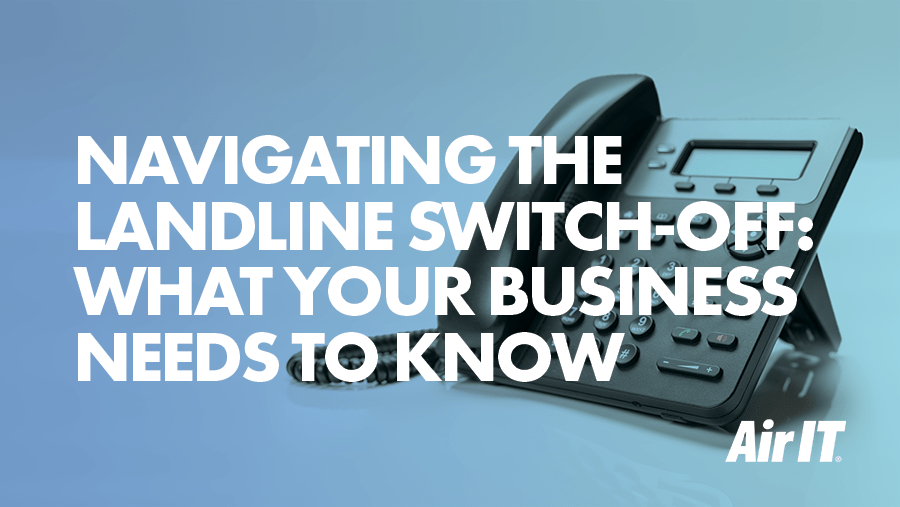At the end of 2025, all UK landlines will be turned off, an event commonly referred to as 'The Big Switch Off'. All phone calls will transition from the traditional PSTN to being hosted over Internet Protocol (IP), enhancing communication with faster and more efficient connectivity. Find out what the PSTN switch-off means for businesses and how you should prepare in 2024.

What is the PSTN?
The Public Switched Telephone Network (PSTN) is a traditional copper wire landline system designed for analogue voice communication. The PSTN has been a vital part of telecommunications for nearly 150 years, providing voice call services for homes and businesses across the UK.
However, due to the rapid advancement of digital technologies, the time has come to phase out landlines. In 2015, the telecoms industry announced that the PSTN and Integrated Service Digital Network (ISDN) would be phased out by 2027. After this date, any services supported on the old copper network will no longer be supported.
Why are landlines being switched-off?
The PSTN mainly depends on copper wires, making them susceptible to deterioration, disruptions, and bad weather conditions, which can impact both voice and internet connectivity.
Landlines are no longer able to cope with the high demands of modern communication, which requires higher speeds and greater bandwidth. They are also becoming increasingly costly to maintain due to the telephone exchange equipment reaching its end of life.
With broadband speeds getting ever quicker, online communication is now the norm, and with cloud-based platforms making connections easier and cheaper, landlines have become outdated.
Therefore, providers such as BT and Virgin have stopped investing in it, focusing instead on providing high-speed digital networks needed for applications today and in the future as modern, all-IP services.
When is the landline switch-off happening?
In September 2023, Openreach conducted a nationwide Stop Sell of Wholesale Line Rental (WRL), meaning any new supply of WRL copper lines and traditional old copper networks is no longer available.
The original Switch-off date was initially scheduled for December 2025. However, it has been confirmed that the deadline has been extended to January 2027. Despite this extension, it remains evident that many businesses still require support to transition away from the old analogue lines. The sheer volume and complexity of this initiative have revealed the limited resources available to assist businesses during this transition.
Therefore, we strongly recommend that businesses plan ahead and upgrade to a modern, VoIP-based telephone provider as soon as possible. Delaying the switch could result in increased costs, inadequate time to select the right supplier, and missed opportunities for fast broadband.
How can my business prepare in 2024?
In 2024, the National Business Communications conducted a survey and found that 62.1% of UK businesses are still using landlines. Shockingly, 44.8% of businesses are still unaware of the upcoming switch-off.
As the landline switch-off fast approaches, businesses must be proactive to safeguard their operations. This involves understanding the change, evaluating connectivity needs, assessing existing infrastructure, planning migration, prioritising security, and establishing backup plans.
By embracing new digital communication technologies, you will benefit from faster speeds, improved reliability, and a strong foundation for future technological advancements that businesses need to stay ahead of the competition.
Make the move
If you haven’t yet made the move to a digital solution, you need to think about moving to digital phone lines such as a VoIP solution or a SIP Trunking product soon.
VoIP phone systems are cloud-based solutions that allow businesses to make calls over the internet which will effectively run over IP instead of traditional phone lines. Whereas a SIP trunk allows you to connect to a regular phone network with an integrated VoIP system.
Full-fibre connectivity provides a whole host of benefits for both consumers and businesses, such as:
- Faster speeds: Traditional copper cables were designed primarily for voice calls and provide speeds of around 60 Mbps. However, full-fibre connections (FTTP) can offer much faster average speeds of up to 1 Gbps.
- Reliability and resilience: Full fibre is ideal for high levels of data transfer, ensuring consistent performance even during peak usage.
- Increased Productivity and efficiency: With a full-fibre connection, users can experience smoother video conferencing, faster file uploads, and seamless collaboration with their peers.
- Cost-effective: Although the initial implementation cost may vary, the long-term benefits of full-fibre connectivity outweigh the cost. These benefits include ensuring minimum downtime and supporting the demand of growing businesses.
- Support remote working: By implementing full fibre, geographical gaps in connectivity are bridged, ensuring high-quality communications are accessible from anywhere.
Upgrading to full-fibre connectivity is essential in building a more efficient and future-proof digital infrastructure, as it enhances productivity, reliability, and overall user experience with faster data transfer speeds.
The Great Switch-off – Beyond the Dial Tone
Watch our webinar on-demand and learn how your business can make the switch from analogue to digital before the December 2025 deadline! Delivered by Air IT’s CISO & CIO Lee Johnson and Giacom’s Matthew Wilcock. Our experts will talk you through the upcoming PSTN & ISDN Switch-off initiative and how you can prepare before the December 2025 deadline.
Please note: This webinar was recorded and published prior to the new 2027 deadline announcement. We recommend that businesses continue their plan to move away from the analogue system as soon as possible to align with resource availability and ensure a successful migration.



